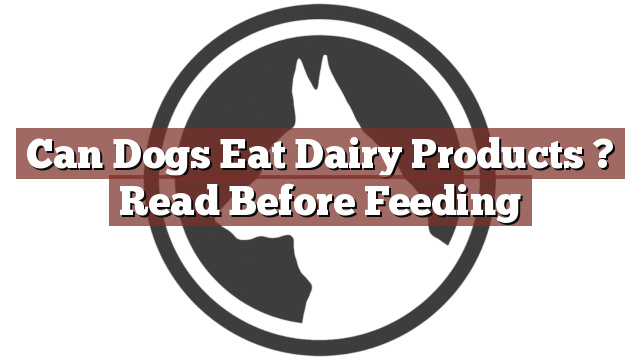Understanding Your Dog’s Dietary Needs
As a responsible dog owner, it is crucial to understand your canine friend’s dietary needs. Dogs are primarily carnivorous animals and require a diet rich in protein and fat. However, they also have the ability to digest certain carbohydrates and vegetables. While dogs can tolerate a wide range of foods, it is important to ensure that their diet is well-balanced and meets their nutritional requirements.
Can Dogs Eat Dairy Products ? Read Before Feeding
Can dogs eat dairy products? This is a common question among dog owners. The answer is, yes, dogs can eat certain dairy products in moderation. However, it is essential to consider a few factors before feeding your furry friend any dairy product. Dogs, like humans, can be lactose intolerant, which means they are unable to digest lactose, the sugar found in milk. Feeding lactose-intolerant dogs dairy products can lead to digestive issues such as diarrhea, gas, and bloating. It is always best to introduce small amounts of dairy gradually and observe your dog’s reaction.
Pros and Cons of Feeding Dairy Products to Dogs
Feeding dairy products to dogs can have both pros and cons. One of the advantages is that certain dairy products, such as plain yogurt or cottage cheese, can be a good source of protein, calcium, and probiotics for dogs. These nutrients are essential for their overall health and can contribute to their bone strength and digestion. However, it is important to choose dairy products that are free from artificial flavors, added sugars, and other additives that can be harmful to dogs.
On the other hand, the cons of feeding dairy products to dogs primarily revolve around lactose intolerance. If your dog shows signs of lactose intolerance, it is best to avoid feeding them dairy altogether. Additionally, some dogs may be allergic to certain dairy proteins, which can lead to skin irritations or gastrointestinal issues. It is recommended to consult with your veterinarian before introducing any new food into your dog’s diet, especially if it contains dairy products.
Conclusion
In conclusion, while dogs can eat dairy products, it is important to approach it with caution. Some dogs may be lactose intolerant or allergic to dairy proteins, which can cause digestive issues or other health problems. If you decide to include dairy in your dog’s diet, choose plain and natural products, free from additives. Always introduce new foods gradually and observe your dog’s reaction. Ultimately, consulting with your veterinarian is the best way to ensure that your dog’s dietary needs are met and that they stay healthy and happy.
Thank you for taking the time to read through our exploration of [page_title]. As every dog lover knows, our furry friends have unique dietary needs and responses, often varying from one canine to another. This is why it's paramount to approach any changes in their diet with caution and knowledge.
Before introducing any new treats or making alterations to your dog's diet based on our insights, it's crucial to consult with a veterinarian about [page_title]. Their expertise ensures that the choices you make are well-suited to your particular pet's health and well-being.
Even seemingly harmless foods can sometimes lead to allergic reactions or digestive issues, which is why monitoring your dog after introducing any new food item is essential.
The content provided here on [page_title] is crafted with care, thorough research, and a genuine love for dogs. Nevertheless, it serves as a general guideline and should not be considered a substitute for professional veterinary advice.
Always prioritize the expert insights of your veterinarian, and remember that the health and happiness of your furry companion come first.
May your journey with your pet continue to be filled with joy, love, and safe culinary adventures. Happy reading, and even happier snacking for your canine friend!

